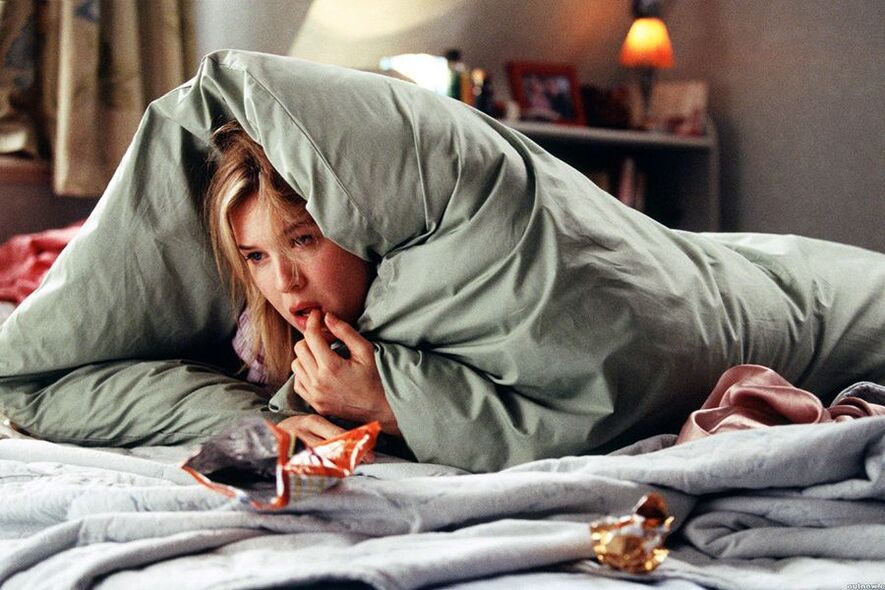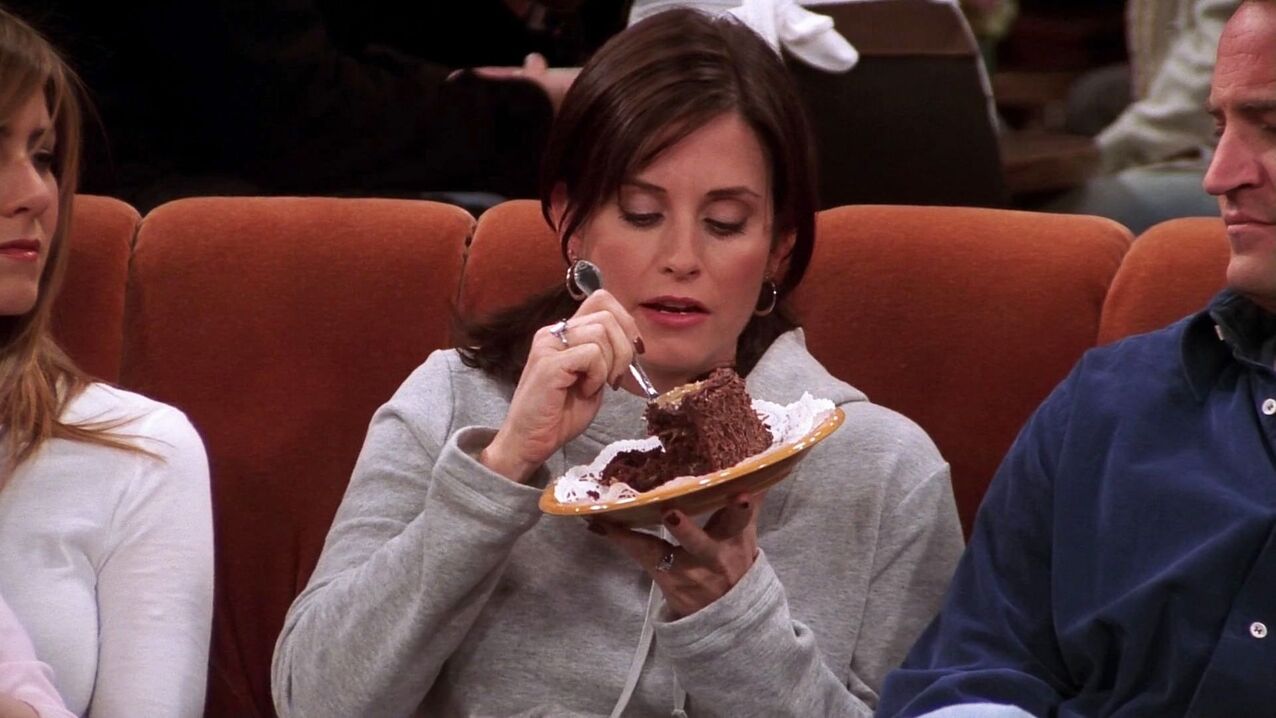
The title contains a search query that is popular with search engines. However, this article doesn’t give advice like "count to 10 and drink a glass of water". Let’s talk about something else: why it’s a bad idea to force yourself not to eat to lose weight, and how to handle our attitude to food.
What’s wrong with not eating because of weight loss?
Practicing psychologist: If you have a healthy attitude towards eating, you’re in touch with your body - you hear your signals and you know how to negotiate with them. If the body indicates hunger, it satisfies, stops eating when satiated. The message "don't eat for weight loss" means breaking this relationship, confronting ourselves, and self-aggression. It turns out you're taking action against yourself to achieve a goal (weight loss). It's not goodSHEboring and unhealthySHEin.
Psychiatrist: Most people who lose weight as a result of a restrictive diet will recover within 1-2 years. Plus, 2/3 of them win more than they lose.
Endocrinologist:The message is to force yourself not to eat to lose weight. It is important to understand: what happens to the body? Maybe it’s not a matter of malnutrition, it’s a matter of hormonal characteristics.
And what is it all about - a healthy attitude to food?
Psychiatrist: In this case, regular meals and snacks are not accompanied by anxiety, shame and guilt. "Forbidden Foods", Lack of Dieting and Calorie Counting. And when you allow yourself to enjoy the food.
Endocrinologist:It’s about treating food as a condition for a full, happy life. And not as a substitute for joy and enjoyment.
Practicing psychologist: That’s when you eat out of hunger, stop when you’re fed up, don’t focus on the shortcomings of your body that need to be "corrected" with food, or refuse to eat when you’re not overeating, don’t get carried away by emotions.
Can you tell me more about it? How and why do we devour emotions?
Practicing psychologist: There are no good or bad emotions for the psyche, you can handle any of them. You don't need food, alcohol, gadgets or TV to do this. But there are situations where a person has suppressed their emotions with food. Outraged, I ate a bowl of ice cream - it got easier. His behavior was positively confirmed, and he began to resort to this strategy over and over again.
Psychological counselor:People often overeat because they lack rest. Let me give you an example. A young woman faced a problem: she eats a lot in the evenings and can’t stop. It turns out he works for three because he doesn’t know how to reject his colleagues. No time to bite: business always. And he can't eat in the evening. That is, one exhausts oneself, overworks oneself, is constantly stressed. How to make up for lost energy? Burger, potatoes, chocolate.
It turns out that if a person is eating bored, anxious, angry, tired or sad, is it okay?
Psychological counselor:This in itself is neither good nor bad: food is unconsciously related to safety. For a newborn, food is not just food, but closeness to the mother, reassurance, confidence, acceptance, love, communication. Adults also eat sometimes to reassure themselves. It’s bad if that’s the only way to deal with anxiety or fear.
Psychiatrist: Food satisfies different psychological needs. For example, having dinner with family is intimacy. Going to a restaurant with friends eliminates the need for social interaction. The problem arises when food becomes the crutch of our negative experiences. This brings us to the topic of eating disorder (EID) or eating disorder. These problems are dealt with in psychiatry.
Wait wait! It turns out that if I ate chocolate after an hour and I feel guilty - is that a disorder already? Should I go to a psychiatrist right away?

Practicing psychologist:Complex problem. There are situations where a person eats while running, chaotically, not paying attention to what they are eating. Or eat when you’re not really hungry - out of boredom or company. It may just be an eating disorder that can be corrected by a nutritionist. But at the same time, eating without hunger is a symptom of RIP. The line is very thin. And this can only be determined by a doctor. In Hungary, a psychiatrist deals with this.
Endocrinologist:It happens that one is constantly sad, worried, tired - and seizes these problems. Maybe it's the result of constant stress. But they are also symptoms of endogenous depression and anxiety neurosis. A psychiatrist is also involved in diagnosing such conditions.
But is ERP not bulimia and anorexia? The symptoms are difficult to confuse
Psychiatrist: It's not just bulimia and anorexia. Eating disorders also include psychogenic overeating (also known as paroxysmal or compulsive), eating inedible foods (Pick’s disease), and psychogenic anorexia. These are disorders that are included in the International Classification of Diseases (ICD). However, there are disorders that are not on this list but attract the attention of psychiatry: selective eating disorder, orthorexia (when the desire for a healthy lifestyle goes beyond any bounds), and pregorexia (the most restrictive diet for pregnant women).
Practicing psychologist: Psychology also differentiates overeating syndrome (BOE): when a person eats almost nothing all day, he can’t sleep for a long time, or he often wakes up and wakes up to the fridge.
Is obesity also ERP?
Psychiatrist: Not always. There can be many reasons - these are genetics, a sedentary lifestyle and hormonal disorders. It is not possible to equate RPP with obesity.
Practicing psychologist: Yes, I agree. There are people with completely healthy eating behaviors who are obese. And the reverse is true - for example, in patients with anorexia nervosa.
Have you heard that the problem with RPP is primarily about women, adolescents, and models? This is true?

Psychiatrist:Of course not. The disorder can develop in both men and women at any age. For example, selective eating disorder is most common in children - the child eats only certain foods.
Practicing psychologist: Anorexia and bulimia are more common in women. But compulsive overeating - in both men and women. So it is impossible to say that RPP is a purely female problem. And yes, teenagers, models, athletes who engage in aesthetic sports (rhythmic gymnastics, figure skating, sports dance), TV presenters, bloggers, actresses - everyone who is in sight and whose work depends on their appearance is in danger. However, the problem can catch up with anyone, including those who are away from modeling or beauty blogging.
It is believed that any nutritional problem is to attract attention. This is true?
Practicing psychologist: There is such an opinion, but it is not scientifically supported. Yes, during therapy, it may turn out that the RPP began when the person was not accepted by peers. For example, for a 13-15 year old girl, it was important for the boys to look at her and be approved by her friends, so she kept a strict diet. It also happens that eating problems are an attempt by a child to get the attention of parents, often unconsciously. But these are rather special cases. It is a mistake to believe that the main cause of eating disorders is the need for attention.
So what's the reason?
Practicing psychologist: There are three groups of causes: biological, psychological, and social. Biological, such as genetic predisposition to RPC, is unfortunately inherited. Psychological - domestic violence, prohibition of expressing negative emotions, violation of parent-child attachment (for example, if the child is a cold, aloof parent). Social - the cult of the ideals of beauty, thinness, harassment.
PsychiatristA: There are certain personality traits that can contribute to the development of EID, such as perfectionism or excessive responsibility. It is also influenced by the characteristics of the family's eating behavior and their attitudes towards body weight and shape. The child could be rewarded with sweets for good behavior, learning, and that stuck: because I’m good, you can buy candy. Very good? i buy ten.
Psychological counselor:Many patients with ECD have experienced physical or sexual abuse. For many, food helps to draw secondary benefits from the situation. For example, one of my clients needed weight to protect herself from men. During therapy, we learned that the girl was in an awkward position with an adult man at school age. The client was surprised to remember this: this story seemed "forgotten" but still influenced the girl's behavior in adulthood. They also discovered that men only love the thin. If so, the extra weight helped her "be safe. ", that is, without men.
How common are eating disorders in society?

Psychiatrist: It is estimated that the prevalence of RPC in the world is about 9%. Prevalence is higher in risk groups. There are studies of adolescent girls that report that by the age of 20, about 13% have symptoms of CRP. Anorexia is one of the deadly mental disorders that precedes chemical dependence.
Practicing psychologist: It’s hard to give exact numbers because people with PAD often don’t understand at all that they need help. There are numbers for the United States as it is the center of research and statistics on eating disorders: approximately 30 million people have eating disorders. There are twice as many women as men (20 million compared to 10 million). And at least 1 person dies every hour in the world from the consequences of RPE.
What are the symptoms of RPE? Can I diagnose myself?
Psychiatrist: In general, the main symptoms are:
- A person vomits after eating or otherwise compensates for what they have eaten, such as excessive physical exertion (physical tyranny), laxatives, and diuretics.
- Strong attachment to weight and shape (you can't add / lose a gram or centimeter! ).
- There are many attempts to lose weight and swing your weight.
- There are a number of dietary rules (I only eat protein, only vegetable, only red).
- Constant thoughts, fears, guilt and shame about eating and losing weight. When thoughts and behaviors about food cause a lot of suffering.
- Loss of control over the amount consumed.
But many can have such symptoms to varying degrees. Is there a more accurate diagnosis?
Endocrinologist:RPD is a systemic chronic disease. It causes metabolic changes in systems and organs, changes in human neurohumoral regulation. This is a complex problem that can manifest itself in neuroses, organic pathologies of the brain, organic lesions, and depressive disorders.
But first you need to determine the cause of the symptoms. For example, if someone rushes to the refrigerator at night, they need to find their glycogen levels to rule out insulin resistance and type 2 diabetes.
What if you understand that you or your loved one has an RPP?
Practicing psychologist: If yes - consult a psychiatrist for diagnosis. If you suspect RPP in a loved one, it’s harder: you often refuse, you don’t want to admit that something is wrong with him. And unnecessary pressure can break trust. Let your loved one know that he is on his side, ready to help and support.
Who manages ECD? Just a psychiatrist?
Psychiatrist: No. He is diagnosed by a psychiatrist. And cures, depending on the illness psychiatrist, psychotherapist, clinical psychologist (prescribed by a psychotherapist). Why is it so important to see a psychiatrist first? Because it can reveal comorbidities such as depression or anxiety disorder, which occur in about 80% of cases in patients with RPD. Treatment depends on the severity of the disease. It can be drug therapy combined with psychotherapy (group, cognitive-behavioral, dialectical-behavioral). Family therapy is also recommended.
Psychological counselor:Anorexia and bulimia are treated primarily by a psychiatrist. Emotional overeating - psychologist, counseling psychologist. Obesity - a nutritional endocrinologist (you need to check your hormones to see if your metabolism is disturbed) along with a psychologist or psychotherapists.















































































